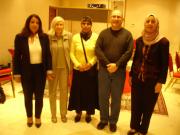

Subscribe to SCP News
Workshop to prepare a draft Monitoring Plan for Persistent Organic Pollutants in Morocco

With regard to the relevant documentation for this meeting several main sources can be identified, firstly the Stockholm Convention (www.pops.int) which maintains extensive archives of technical and scientific knowledge on POPs and in particular the GMP documents. The GMP is developing a technical guidance document (draft revised guidance on the Global Monitoring Plan for Persistent Organic Pollutants)This document describes in detail the principles, methods and substances considered by the GMP and provide the basis for discussion of the monitoring plan.
(http://chm.pops.int/Convention/COP/Meetings/COP5/COP5Documents/tabid/1268/Default.aspx)
(COP5/INF27).
A french translation of the 2007 version of the GMP guidance document is available at
http://chm.pops.int/Implementation/GlobalMonitoringPlan/Overview/tabid/83/Default.aspx
The WHO in cooperation with UNEP Chemicals and GEF have carried out several global surveys of human breast milk , the next round will be in 2013-2015 and this meeting could help pave the way for a participation by Morocco in this round.
The french version of the WHO protocol for POPs in human milk can be found at:
http://www.who.int/foodsafety/chem/POPprotocol_fr.pdf
The database mantained by UNEP Chemicals of laboratories working on POPs and participating in intercalibration rounds can be found at :
http://www.chem.unep.ch/databank/Home/Welcome.aspx
The Arctic Monitoring and Assessment Program (AMAP) (www.amap.no) has been working intensely for 30 years monitoring POPs in the environment and people and therefore has a large technical experience and solid scientific information. Regarding the measurement of concentrations of POPs in the air a very good review is available at
(http://amap.no/documents/index.cfm?dirsub=%2FAMAP%20Assessment%202009%20-%20POPs%20in%20the%20Arctic&sort=default)
Concerning POPs in humans see:
And finally the work undertaken as part of the Task Force on Hemispheric Transport of Air Pollution HTAP (www.htap.org) and in particular the document of 2010
http://www.htap.org/activities/2010_Final_Report/HTAP 20Part% 20C% 202010% 20110408.pdf
presents a good summary of the best available information on a global scale POPs in the atmosphere.














